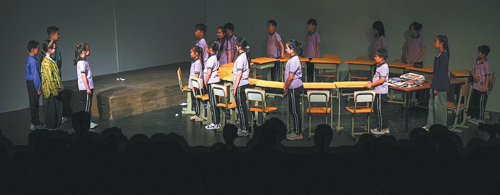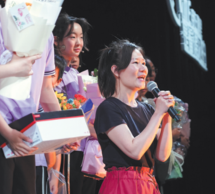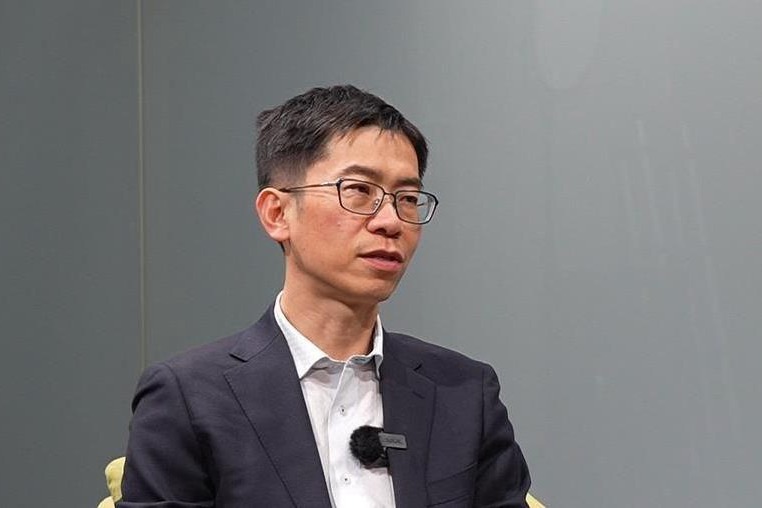The self in the age of social media
Play explores the impact of networking sites on students from a teenage perspective, Cheng Yuezhu reports.

While the debate over use of smartphones by children continues, few adults have paused to truly listen to what the young themselves think, or how they experience the digital world.
"I have a stronger sense of presence online. In real life, because I'm not that outgoing, I don't have enough courage to make friends, even if I would like to," says Yu Minjia, a 12-year-old performer from the DR. Youth Theatre.
"People often feel like they're free when they pick up their phones, when in fact, they have been constrained by them," says Yang Jinsheng, a fellow performer who is 9, expressing his view.
Over the past nine months, these young actors have been exploring their thoughts on technology, expressing themselves through art and writing, and incorporating their experiences into theatrical roles under the guidance of educational theater facilitators.
The final production, Who Am I?, by British playwright Chris Cooper and performed by the DR. Youth Theatre, was held at Beijing's Drum Tower West Theatre on Saturday and Sunday.
A classroom confrontation sets the stage for the drama as one student challenges her teacher's authority. Criticized by the teacher and then bullied by her classmates, she pours ink on one of the bullies and flees to a parallel classroom, where she is alone, yet able to hear her classmates' inner thoughts.
Through this combination of fictional setting and realistic subject, the play takes the audience on an exploration of technology and the impact of social media on teenagers, offering insights into understanding the complex realities of young life.
Under the guidance of director Chen Yuan, the young performers, aged between 8 and 13, were encouraged to participate in the creative process by developing their own characters, contributing writing and art to the production, and sharing their perspectives.
"I believe that 'who am I' is a question everyone has asked themselves. This philosophical question, that should be explored over an extended period of time, has become an everyday question due to the prevalence of social media," Chen says.
Chen, who is also a facilitator at Drama Rainbow Education, the organization producing the play, conducted one-on-one conversations with the young members and their parents before its launch last September.
From these discussions, she learned that many students were experiencing subtle forms of cyberbullying. Unlike direct confrontations that could be reported to teachers, these incidents often remained hidden from adults.
In more than one case, the students changed their profile picture or shared something on social media — a song, a photo — that was then mocked by their peers, leading to distress and isolation.
"I felt with a sense of urgency that today's teenagers are very different from our generation. These days, parents protect their children very carefully in life, but don't know how to monitor them online, often leaving them unsupervised," Chen says.
"As a result, children cannot express themselves in the real world and turn to the internet. There, they encounter many problems they can't discuss with adults, because adults might dismiss these issues as insignificant."
Chen then shared her concerns about technology and social media with Chris Cooper, an expert in theater in education and a consultant for Drama Rainbow Education, and invited him to write the play.
"We urgently needed a play that responded to the situations these children are facing," she adds.
"Chris Cooper is a remarkable playwright and director with a strong understanding of China. I feel that having such a visionary extract the experiences of today's children and transform them into a play is incredibly important."
When Cooper began researching and working on the play, he was struck by the different perspectives of the older and younger generations. While the older generation tends to make a clear division between the digital world and reality, the young constantly move between the two realms.
"In fact, I'd go further to say that the synthesis between the virtual world and the real world is such now that for our children, it is the reality. It's a profound change in culture and in human consciousness," Cooper says.
Prior to the production, Chen asked Cooper to present a story framework, deliberately leaving space for development.
Through a collaborative creative process with the youngsters, who wrote poems and created drawings and installations, the final production has been enriched by what emerged.
In a creative session, Chen helped the students to each design a desk for their character. They began with sketches on paper, and then turned desks into art installations. Through symbolic elements and hidden objects, the owners' secrets and personal struggles are made apparent.
"When the protagonist pulls objects from the desks, she is able to hear the inner voices of those to whom they belong. These voices are the work of the children themselves. The creative process is actually an exploration of the feelings experienced by primary and middle school students," Chen says.
"Through the voices, we are able to see that the characters have secrets, weaknesses, and sentiments they can't express to others. Theater helps us understand our children, feel what they feel and better support them."
The production also includes a personified AI character, who appears to talk with the protagonist whenever she encounters a struggle. According to Chen, this is a reflection of the fact that a lot of youngsters now resort to AI chatbots instead of their friends and family when they need to talk with someone.
"But in my conversations with the children, they also said the chatbots can't really solve any problem. They can never replace real human beings, but simply use big data analytics to generate a response. When they are picked on by others, chatbots often tell them to be understanding or reasonable, which they find unhelpful," she says.
Through the performance and creativity of young performers, the play asks the audience, teenagers and adults alike, "who am I" in this world of information overload and increasing dependence on digital tools.
"This play is about how relationships between children are mediated by the tools of social media, and also how the relationship between adults and children is mediated by a deeper crisis, which is an inability to recognize the needs of each other, and be able to speak to each other," Cooper says.



Today's Top News
- French president to visit China this week
- Japan tempting fate if it interferes in the situation of Taiwan Strait
- Stable trade ties benefit China, US
- Experts advocate increasing scope of BRI to include soft power sectors
- New engine powers cargo drone expansion
- China to boost green industry cooperation






























